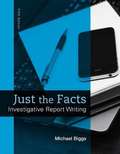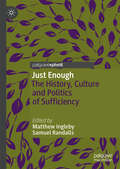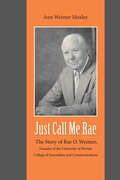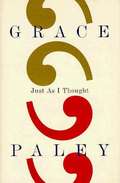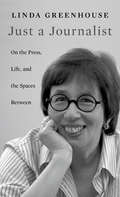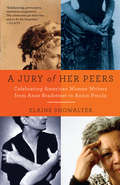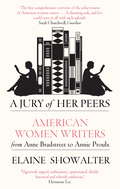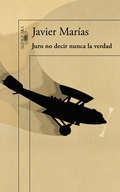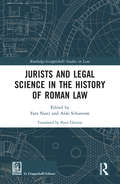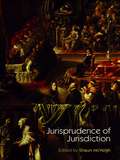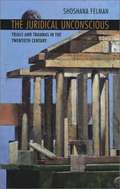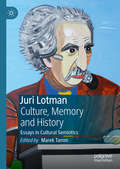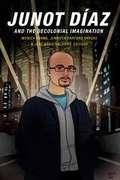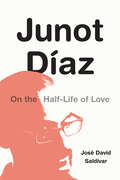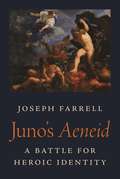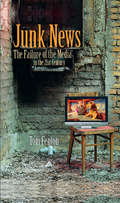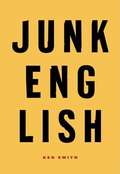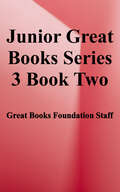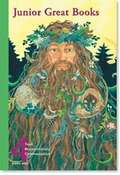- Table View
- List View
Just The Facts: Investigative Report Writing
by Michael BiggsJust the Facts: Investigative Report Writing can be used for all courses in law enforcement report writing in any criminal justice program. It is also a suitable reference for investigators. Just the Facts brings together all the simple rules and techniques students need to write effective investigative reports in law enforcement. Its user-friendly methodology works in any context, with any crime, regardless of the case's complexity. Each chapter focuses on one major component of the report writing process, carefully building on what has already been learned. Coverage includes: investigation basics, note taking, narrative writing, describing persons and property, crime and arrest reports, writing interviews and search warrants, and more. Updated with new Learning Objectives, writing exercises, and expanded content the Fifth Edition retains its focus on consistency, simplicity, and thoroughness in documenting the results of an investigation.
Just Enough: The History, Culture and Politics of Sufficiency
by Matthew Ingleby Samuel RandallsThis book fosters a wide-ranging and nuanced discussion of the concept of ‘enough’. Acknowledging the prominence of notions of sufficiency in debates about sustainability, it argues for a more complex, culturally and historically informed understanding of how these might be manifested across a wide array of contexts. Rather than simply adding further case studies of sufficiency in order to prove the efficacy of what might be called ‘finite planet economics’, the book holds up to the light a crucial ‘keyword’ within the sustainability discourse, tracing its origins and anatomising its current repertoire of usages. Chapters focus on the sufficiency of food, drink and clothing to track the concept of 'enough' from the Middle Ages to the 21st century.By expanding the historical and cultural scope of sufficiency, this book fills a significant gap in the current market for authors, students and the wider informed audience who want to more deeply understand the changing and developing use of this term.
Just Call Me Rae: The Story of Rae O. Weimer, Founder of the University of Florida College of Journalism and Communications
by Ann Weimer MoxleyDistributed on behalf of the University of Florida College of Journalism and CommunicationsRae O. Weimer founded the University of Florida’s first school of journalism, and within one year of his arrival in Gainesville, the school received accreditation. No longer would Florida’s students have to leave the state to pursue dreams of becoming journalists. Just Call Me Rae chronicles the life of the man who pioneered journalism education in Florida and built one of the most innovative journalism and communications programs in the country. Rae grew up in a small Midwestern town where he learned to be resourceful and hardworking, traits that would make him—along with his reputation—the prime candidate to lead UF’s small journalism department. Due to economic hardship, he dropped out of college in his final year, but he knew he was destined to be a newspaperman. He learned everything he could about the profession, taking any job that came his way. Between 1925 and 1940, Rae worked for eleven newspapers in six states, including the Akron Beacon Journal and Cleveland Press in Ohio and the Buffalo Times in New York. The culmination of his newspaper career was his role at the revolutionary and historic PM newspaper in New York City. At PM, Rae rubbed elbows with some of the greatest journalists and writers of his generation, including Dorothy Parker, Ernest Hemingway, Ted Geisel (Dr. Seuss), Max Lerner, I. F. “Izzy” Stone, Dashiell Hammett, and Pulitzer Prize-winner Edna Ferber. Rae’s reputation ran ahead of him to Florida, where the state’s newspapers were agitating for upgrading journalism education at UF. Rae might not have had the degrees that other candidates had, but he had the credentials—he was a seasoned newspaperman, a trained newspaper technician, and his years at PM had honed his teaching instinct. UF President J. Hillis Miller agreed to hire Rae, and so would begin the legend of the degreeless dean. Rae re-envisioned journalism at the University of Florida. With his leadership, what had been a three-person department that rarely exceeded twenty students grew into the School of Journalism. He expanded the school to include advertising and radio and television journalism in the curriculum, and by the 1960s UF's School of Journalism was the fastest growing journalism program in the country. In 1968, shortly after Rae retired, the School became the College of Journalism and Communications, and today it is still ranked among the nation’s top journalism programs, with students hired at news organizations across the country, including highly competitive newsrooms in New York, Washington, D.C., Chicago, and Los Angeles. With the communication skills they developed at the college, many pursue careers in public service, politics, law and public relations. This book is an eye-opening chronicle of Rae Weimer’s lasting legacy to journalism in the state of Florida.Distributed by University Press of Florida on behalf of the University of Florida College of Journalism and Communications
Just as I Thought
by Grace PaleyThis collection of articles, reports, and talks by National Book Award finalist Grace Paley represents approximately 30 years of political and literary activity--with a couple of occasional glances over her shoulder into disappearing family and children--and comes as close to an autobiography as anything we are likely to have from this quintessentially American writer.
Just a Journalist: On the Press, Life, and the Spaces Between (The William E. Massey Sr. lectures in American studies ; #2015)
by Linda GreenhouseA Pulitzer Prize–winning reporter who covered the Supreme Court for The New York Times, Linda Greenhouse trains an autobiographical lens on a moment of transition in U.S. journalism. Calling herself “an accidental activist,” she raises urgent questions about the role of journalists as citizens and participants in the world around them.
A Jury of Her Peers: American Women Writers from Anne Bradstreet to Annie Proulx
by Elaine ShowalterFascinating, incisive, intelligent and never afraid of being controversial, Elaine Showalter introduces us to more than 250 writers. Here are the famous and expected names, including Harriet Beecher Stowe, Willa Cather, Dorothy Parker, Flannery O'Connor, Gwendolyn Brooks, Grace Paley, Toni Morrison, and Jodi Picoult. And also many successful and acclaimed yet little-known writers, from the early American bestselling novelist Catherine Sedgwick to the Pulitzer Prize-winning playwright Susan Glaspell. A JURY OF HER PEERS is an irresistible invitation to discover great authors never before encountered and to return to familiar books with a deeper appreciation. It is a monumental work that enriches our understanding of American literary history and culture.
A Jury Of Her Peers: American Women Writers from Anne Bradstreet to Annie Proulx
by Elaine ShowalterFascinating, incisive, intelligent and never afraid of being controversial, Elaine Showalter introduces us to more than 250 writers. Here are the famous and expected names, including Harriet Beecher Stowe, Willa Cather, Dorothy Parker, Flannery O'Connor, Gwendolyn Brooks, Grace Paley, Toni Morrison, and Jodi Picoult. And also many successful and acclaimed yet little-known writers, from the early American bestselling novelist Catherine Sedgwick to the Pulitzer Prize-winning playwright Susan Glaspell.A JURY OF HER PEERS is an irresistible invitation to discover great authors never before encountered and to return to familiar books with a deeper appreciation. It is a monumental work that enriches our understanding of American literary history and culture.
Juro no decir nunca la verdad
by Javier MaríasTras el éxito de Así empieza lo malo (Libro del Año según Babelia), el nuevo libro de artículos de una voz siempre indispensable y brillante. «Quien no lea a Marías está condenado.»The Nation Este volumen reúne los noventa y cinco artículos publicados por Javier Marías en el suplemento dominical El País Semanal entre el 10 de febrero de 2013 y el 1 de febrero de 2015. En opinión del autor, «nos encontramos en una situación de emergencia que obliga a mancharse con la suciedad que esparcen nuestros gobernantes de todo signo. Cuando los abusos no son la excepción, sino la regla; cuando no se da abasto a contrarrestar -qué digo: a señalar- los desmanes y tropelías, entonces no hay más remedio que emporcarse. Ningún combate se libra desde el tendido. [...] Qué más quisiera yo que mirar desde el tendido con aprobación y complacencia, y no soliviantarme con las noticias de cada mañana.» Las piezas recogidas en Juro no decir nunca la verdad conforman una crónica del periodo, no sólo política -pese a que la impotencia y el hartazgo del ciudadano común están omnipresentes, así como las dolorosas consecuencias de la crisis y la falacia de la recuperación económica-, sino también social y cultural: los estúpidos hábitos originados por el uso de las nuevas tecnologías, el lamentable estado de la cultura en España, el cine y la literatura, los excéntricos regalos bélicos de su amigo Pérez-Reverte, los comportamientos incívicos, el adiós a algunos seres queridos y las falsedades interesadas sobre los intelectuales son otros de los temas tratados. En suma, en este libro Javier Marías ofrece una fiel instantánea de la realidad llena de agudeza e ironía. Y nos brinda el impulso y las claves necesarias para pensar por nuestra cuenta en el tiempoen el que vivimos. Reseñas:«Su mente es profunda, aguda, a veces turbadora, a veces hilarante, y siempre inteligente.»Edward St Aubyn, The New York Times Book Review «Las piezas recogidas en Juro no decir nunca la verdad conforman una crónica del periodo, no sólo política sino social y cultural.»Luis Alonso Girgado, Diario de Arousa
Jurists and Legal Science in the History of Roman Law (Routledge-Giappichelli Studies in Law)
by Fara NastiThis book provides a new approach to the study of the History of Roman Law. It collects the first results of the European Research Council Project, Scriptores iuris Romani - dedicated to a new collection of the texts of Roman jurisprudence, highlighting important methodological issues, together with innovative reconstructions of the profiles of some ancient jurists and works. Jurists were great protagonists of the history of Rome, both as producers and interpreters of law, since the Republican Age and as collaborators of the principes during the Empire. Nevertheless, their role has been underestimated by modern historians and legal experts for reasons connected to the developments of Modern Law in England and in Continental Europe. This book aims to address this imbalance. It presents an advanced paradigm in considering the most important aspects of Roman law: the Justinian Digesta, and other juridical late antique anthologies. The work offers an historiographic model which overturns current perspectives and makes way for a different path for legal and historical studies. Unlike existing literature, the focus is not on the Justinian Codification, but on the individualities of ancient Roman Jurists. As such, it presents the actual legal thought of its experts and authors: the ancient iuris prudentes. The book will be of interest to researchers and academics in Classics, Ancient History, History of Law, and contemporary legal studies.
Jurisprudence of Jurisdiction
by Shaun McVeighFor much of the history of the western legal order, jurisdiction has been the first question of law. This book investigates the difference that jurisdiction continues to make to the ordering of normative existence. It also follows the speculation that without an account of jurisdiction, jurisprudence would be left speechless, with no power to address the conditions of attachment to legal and political order. The starting point of this book lies with the claim that a sharper focus can be given to normative legal ordering through questions of jurisdiction than can be through those of moral responsibility or social action. This is so because jurisdiction articulates both the potentiality of law and the conditions of its exercise. It provides the idiom of response to the fact that there is law and to the fact that law institutes, judges and addresses a form of life. From this viewpoint the contributors to this book examine the institution of human rights, the new global and national orders of sovereign power and of trade and information, the judgment and government of death and desire, and the address of colonial and post-colonial legal idioms. In doing this the contributors also provide for the elaboration of questions of jurisdiction as part of the resources and repertoires of jurisprudence. This book provides a point of entry to an emergent genre of writing within doctrinal, historical and critical jurisprudence that has returned to questions of jurisdiction to think again about juridical order and change. In so doing, it also points to questions that must be asked for there to be any interdisciplinary study that addresses law.
The Juridical Unconscious: Trials and Traumas in the Twentieth Century
by Shoshana FelmanDeath, wrote Walter Benjamin, lends storytellers all their authority. How do trials, in turn, borrow their authority from death? This book offers a groundbreaking account of the surprising interaction betweenm trauma and justice.
Juri Lotman - Culture, Memory and History: Essays in Cultural Semiotics
by Marek TammThis volume brings together a selection of Juri Lotman’s late essays, published between 1979 and 1995. While Lotman is widely read in the fields of semiotics and literary studies, his innovative ideas about history and memory remain relatively unknown. The articles in this volume, most of which are appearing in English for the first time, lay out Lotman’s semiotic model of culture, with its emphasis on mnemonic processes. Lotman’s concept of culture as the non-hereditary memory of a community that is in a continuous process of self-interpretation will be of interest to scholars working in cultural theory, memory studies and the theory of history.
Junot Díaz and the Decolonial Imagination
by José David Saldívar Jennifer Harford Vargas Monica HannaThe first sustained critical examination of the work of Dominican-American writer Junot Díaz, this interdisciplinary collection considers how Díaz's writing illuminates the world of Latino cultural expression and trans-American and diasporic literary history. Interested in conceptualizing Díaz's decolonial imagination and his radically re-envisioned world, the contributors show how his aesthetic and activist practice reflect a significant shift in American letters toward a hemispheric and planetary culture. They examine the intersections of race, Afro-Latinidad, gender, sexuality, disability, poverty, and power in Díaz's work. Essays in the volume explore issues of narration, language, and humor in The Brief Wondrous Life of Oscar Wao, the racialized constructions of gender and sexuality in Drown and This Is How You Lose Her, and the role of the zombie in the short story "Monstro." Collectively, they situate Díaz's writing in relation to American and Latin American literary practices and reveal the author's activist investments. The volume concludes with Paula Moya's interview with Díaz.Contributors: Glenda R. Carpio, Arlene Dávila, Lyn Di Iorio, Junot Díaz, Monica Hanna, Jennifer Harford Vargas, Ylce Irizarry, Claudia Milian, Julie Avril Minich, Paula M. L. Moya, Sarah Quesada, José David Saldívar, Ramón Saldívar, Silvio Torres-Saillant, Deborah R. Vargas
Junot Díaz: On the Half-Life of Love
by José David SaldívarIn Junot Díaz: On the Half-Life of Love, José David Saldívar offers a critical examination of one of the leading American writers of his generation. He explores Díaz’s imaginative work and the diasporic and immigrant world he inhabits, showing how his influences converged in his fiction and how his writing—especially his Pulitzer Prize--winning novel The Brief Wondrous Life of Oscar Wao—radically changed the course of US Latinx literature and created a new way of viewing the decolonial world. Saldívar examines several aspects of Díaz’s career, from his vexed relationship to the literary aesthetics of Whiteness that dominated his MFA experience and his critiques of the colonialities of power, race, and gender in culture and societies of the Dominican Republic, United States, and the Américas to his use of the science-fiction imaginary to explore the capitalist zombification of our planet. Throughout, Saldívar shows how Díaz’s works exemplify the literary currents of the early twenty-first century.
Juno's Aeneid: A Battle for Heroic Identity (Martin Classical Lectures #36)
by Joseph FarrellA major new interpretation of Vergil's epic poem as a struggle between two incompatible versions of the Homeric heroThis compelling book offers an entirely new way of understanding the Aeneid. Many scholars regard Vergil's poem as an attempt to combine Homer’s Iliad and Odyssey into a single epic. Joseph Farrell challenges this view, revealing how the Aeneid stages an epic contest to determine which kind of story it will tell—and what kind of hero Aeneas will be.Farrell shows how this contest is provoked by the transgressive goddess Juno, who challenges Vergil for the soul of his hero and poem. Her goal is to transform the poem into an Iliad of continuous Trojan persecution instead of an Odyssey of successful homecoming. Farrell discusses how ancient critics considered the flexible Odysseus the model of a good leader but censured the hero of the Iliad, the intransigent Achilles, as a bad one. He describes how the battle over which kind of leader Aeneas will prove to be continues throughout the poem, and explores how this struggle reflects in very different ways on the ethical legitimacy of Rome’s emperor, Caesar Augustus.By reframing the Aeneid in this way, Farrell demonstrates how the purpose of the poem is to confront the reader with an urgent decision between incompatible possibilities and provoke uncertainty about whether the poem is a celebration of Augustus or a melancholy reflection on the discontents of a troubled age.
Junk News
by Tom FentonIn this salient critique of the American media, veteran journalist Tom Fenton exposes the dangerous failings of our news organizations and the fundamental problems with how they present world news. Junk News is a stirring call to reform the faltering "fourth estate" and to take the blinders off our citizens for the sake of our security.Tom Fenton is a four-time Emmy Award-winning journalist and was the senior foreign correspondent for CBS News. He is the author of Bad News: The Decline of Reporting, the Business of News, and the Danger to Us All. He currently works as a BBC commentator.
Junk English
by Ken Smith"Language atrocities infest present-day English. To survey the damage, Ken Smith has subjected himself to an unprecedented barrage of mindless jargon, euphemisms, and weasel words, cataloging for inspection and ridicule monstrosities such as impactful and smartize, empty rhetoric such as quality of life and revolutionary in nature, and broad swaths of modern-day grammatical humbug such as Artificial Vocabulary, Parasitic Intensifiers, Useless Cabooses, and Hyphen-Monsters." "With hundreds of examples pulled from everyday life, Junk English shows how our language is becoming so pliable and flabby that the more we read and hear, the less we know."--BOOK JACKET.Title Summary field provided by Blackwell North America, Inc. All Rights Reserved
Junior Great Books (Series 3 #2)
by Great Books Foundation StaffJunior Great Books Series 3 introduces students to outstanding, interpretive literature from around the world. Book Two of Series 3 features nine stories by award-winning authors. These stories are organized around three themes: gratitude, courage, and cleverness.
Junior Great Books: Book One
by Great Books Foundation StaffSeries 4, Book One Student Edition (2014)
